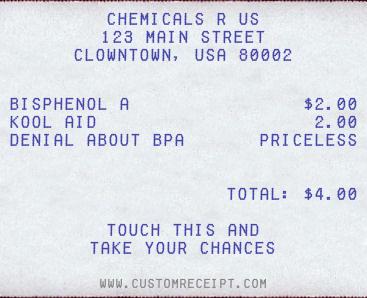Here's Your Change, Have a Nice BPA Day
 The Environmental Working Group (EWG) performed laboratory tests on cash register receipts from major U.S. businesses and found bisphenol A (BPA) present on 40% of them, some at levels higher than those found in canned foods, baby bottles and infant formula. BPA is an estrogen-like, plastic-hardening chemical added to many everyday items and that has been linked to breast cancer, heart disease, diabetes and other illnesses. It reacts with dye to form the black or colored print on heat-sensitive paper receipts that millions of people are handed every day while doing business at retail stores. The U.S. Food and Drug Administration had previously declared BPA safe, but announced in January, 2010 that in light of new studies it now has "concerns" about the chemical's potential effects on brain development of fetuses, infants and children. It stopped short of saying BPA is unsafe. The receipts EWG tested came from businesses in seven states and the District of Columbia, including Safeway, CVS, Whole Foods, Walmart, Chevron, McDonald's, the U.S. Postal Service and cafeterias in the U.S. Senate and House of Representatives. The American Chemistry Council, which represents the chemical industry, maintains the concerns about exposure to BPA are overblown.
The Environmental Working Group (EWG) performed laboratory tests on cash register receipts from major U.S. businesses and found bisphenol A (BPA) present on 40% of them, some at levels higher than those found in canned foods, baby bottles and infant formula. BPA is an estrogen-like, plastic-hardening chemical added to many everyday items and that has been linked to breast cancer, heart disease, diabetes and other illnesses. It reacts with dye to form the black or colored print on heat-sensitive paper receipts that millions of people are handed every day while doing business at retail stores. The U.S. Food and Drug Administration had previously declared BPA safe, but announced in January, 2010 that in light of new studies it now has "concerns" about the chemical's potential effects on brain development of fetuses, infants and children. It stopped short of saying BPA is unsafe. The receipts EWG tested came from businesses in seven states and the District of Columbia, including Safeway, CVS, Whole Foods, Walmart, Chevron, McDonald's, the U.S. Postal Service and cafeterias in the U.S. Senate and House of Representatives. The American Chemistry Council, which represents the chemical industry, maintains the concerns about exposure to BPA are overblown.
- 3714 reads
 Printer-friendly version
Printer-friendly version- Add new comment
- permalink





Comments
Interesting...
Interesting informatoin to be aware of. But I just wonder how much of a concern it really is. Unless you handle boatloads of receipts everyday, it's not something to be worried about, is it? Does this BPA have to be inhaled or does it penetrate the skin of the handler? Are cashiers at risk, for example? Does it affect adults as well as infants and small children?
BPA Scare
Sounds like another manufactured crisis to me. What are the actual test results, how big was the sample universe? How many receipts would I have to ingest to to trigger the adverse effects that may be linked to BPA? Do they realize the volume of sales receipts that are generated on a daily basis and they only found that 40% of their sample contained BPA? I think some needs to get some perspective before trying to scare us poor yokels.